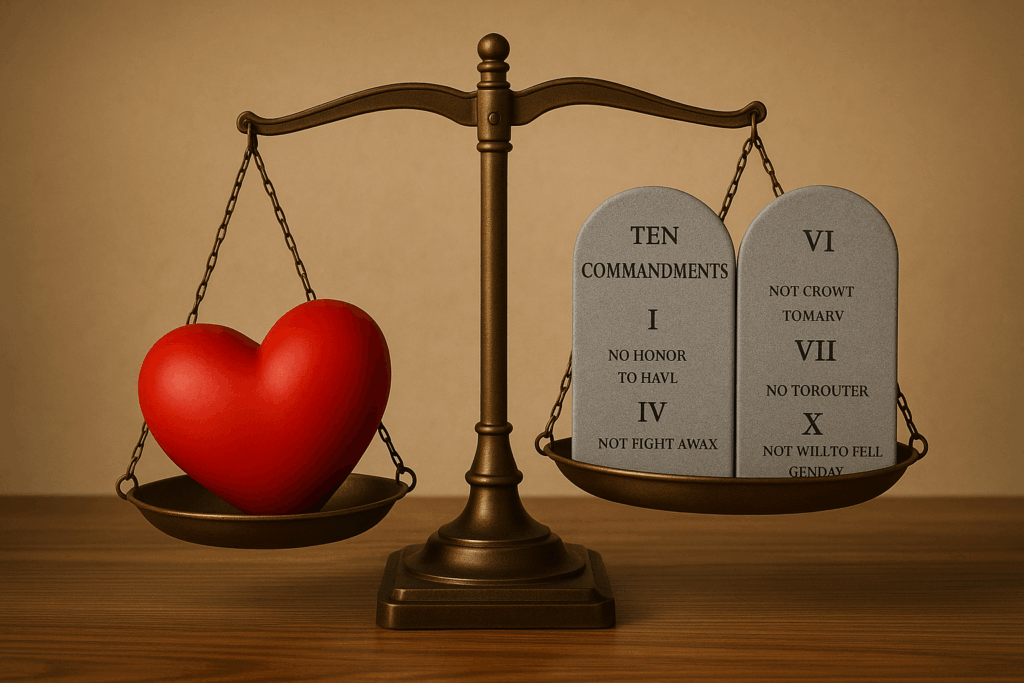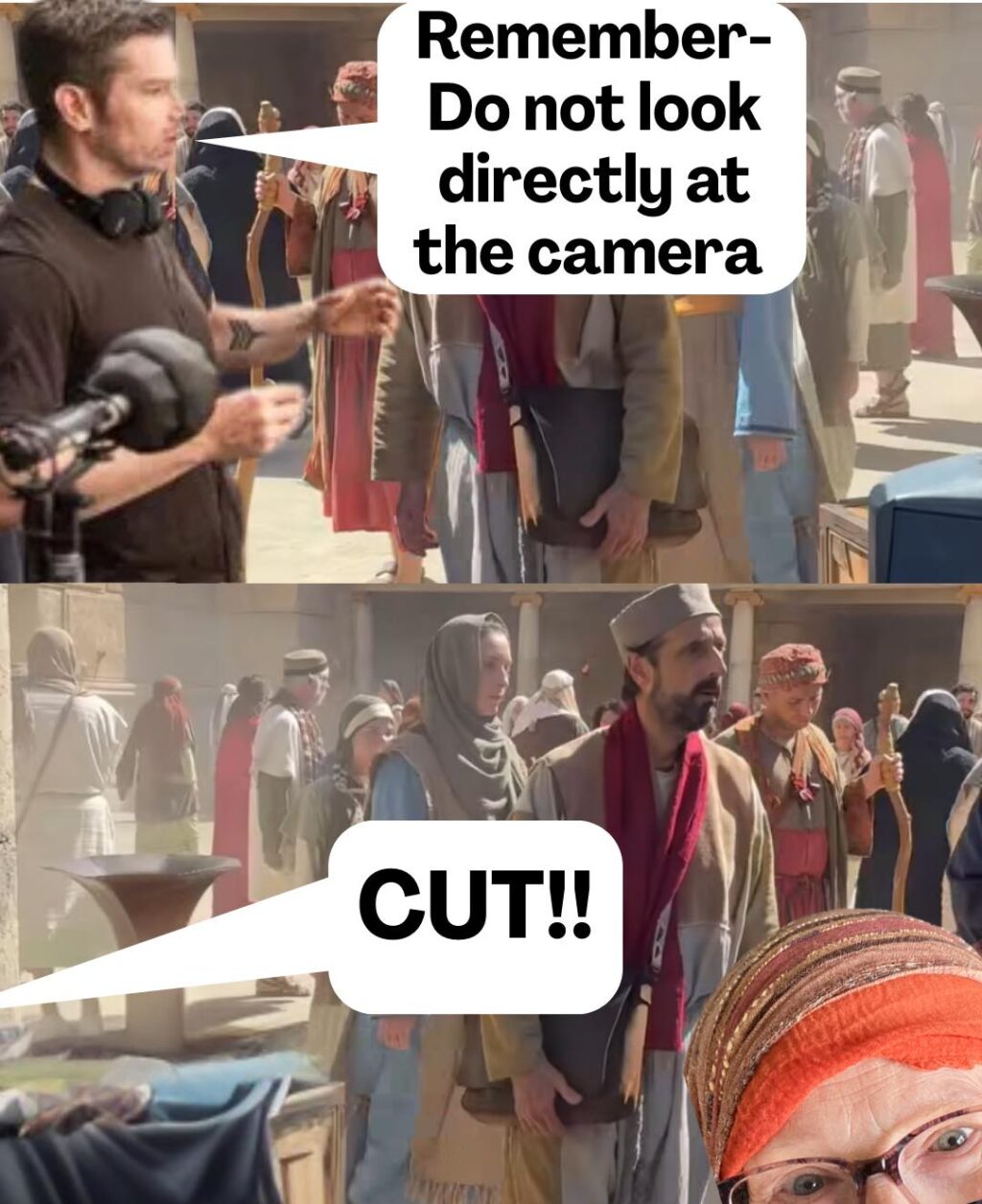
Recently, I had the amazing privilege of being an extra on The Chosen for the second time. For those unfamiliar with it, the show is about the life of Jesus. They are currently filming Season 6, which is all about Good Friday. I was one of the unpaid extras who made up crowds of people needed for certain scenes. And don’t ask for spoilers, because I won’t tell! At least, until it is released next year. And especially if I end up on screen.
They have several rules for the unpaid extras, such as not going back to their car until they leave (for security reasons) and not taking pictures on set (to prevent spoilers).
The no-pictures rule made sense to me. They don’t want people taking photos and videos of the scenes that won’t be public for almost a year. However, some of the extras were not following the rules. So the second day I was there, they decided to have a zero-tolerance policy around phone use, asking people to turn them off and keep them in their bags. But they didn’t make a proper announcement; we learned about it from a guy walking around telling people to put their phones away.

I was a bit rebellious at first. I knew the rule’s purpose and had no intention whatsoever of taking any photos; I was just killing time doing a puzzle on a phone that was silenced and set to do not disturb. But I realized that with a group of 600 people, they have to enforce a rule that encompasses everyone for every reason. Books were fine, but they wouldn’t let someone read on their phone, because it would be so easy to sneak a photo. I was annoyed, but God and I talked about it (mostly about my phone addiction, which I admit is an issue), and I came to terms with the rule and left my phone in my bag.
And then I had an epiphany.
The Purpose of the Law
Got gives laws, not for the sake of making laws, but to prevent the excessive prevalence of evil. Think of what it was like before the flood: “The LORD observed the extent of human wickedness on the earth, and he saw that everything they thought or imagined was consistently and totally evil.” Genesis 6:5, NLT. There is no record of a law before the flood, other than the one about not eating the forbidden fruit, and that one certainly does not apply to us today.
Apparently, there were laws before Israel left Egypt, because God said that “Abraham listened to me and obeyed all my requirements, commands, decrees, and instructions” (Genesis 26:5, NLT). Ultimately, God gave Israel the Decalogue, along with another 603 commandments that the Jews tried to follow. Most of those don’t even apply to us today.
Jesus informed us that there are two great commandments: Love God with all your heart and your neighbor as yourself (see Matthew 22:37–40). Paul echoes this when he says that “whoever loves others has fulfilled the law” (Romans 13:8, NIV). Love is what is important. The book of 1 John makes that very clear.
Paul makes an interesting statement in 1 Timothy about the law that used to puzzle me. “For the law was not intended for people who do what is right. It is for people who are lawless and rebellious, who are ungodly and sinful…” 1 Timothy 1:9, NLT. I’ll spare you the whole list of sins he mentions, but what he says at the end is instructive: “or who do anything else that contradicts the wholesome teaching that comes from the glorious Good News entrusted to me by our blessed God” (verses 10–11, NLT).
I used to be puzzled by the idea that the law wasn’t made for righteous people. Don’t all people need God’s law? Isn’t being without law the very definition of sin? After all, “Sin is lawlessness.” 1 John 3:4, NIV. I was taught that the law is important. That we need to obey it. That it is still binding on Christians today—not the whole Torah, of course, but at least the 10 Commandments.
If this verse were the only one that spoke of the law this way, it would be easy to ignore. But I see a consistency in Paul’s writings. In Galatians, he says, “Therefore the law was our tutor to bring us to Christ, that we might be justified by faith. But after faith has come, we are no longer under a tutor.” Galatians 3:24–25, NKJV. A tutor is to teach people. The law teaches us, but it cannot save us. It shows us what kind of person we are (see James 1:24), but it can’t change our hearts any more than a mirror can clean one’s face.
Reactionary Laws
Paul continues to be consistent in talking about the law. “What purpose then does the law serve? It was added because of transgressions.” Galatians 3:19, NKJV. I think about those extras at the filming of The Chosen. They added the rule that the cell phones must be off and out of sight because people kept taking pictures. If people had only read Kindle books or played silent puzzles on their phone when they were off to the side not being filmed, there would have been no need for rule. But they could not seem to keep a few of the extras from breaking the rules, so they made a stricter rule and added a harsh penalty for breaking it: getting kicked off the set for the rest of the day. And it worked. People stopped taking pictures.

I used to work on the campus of a boarding Academy. They had a small pond on campus, and the school handbook had a rule that said students were not to skinny dip in the pond. It was oddly specific. One of the graduates told me that she and a friend had gone skinny dipping in it, and that’s why there was a rule against it. There hadn’t been before.
If you look at the laws in the Old Testament, you will see that a lot of them are in reaction to what the nations around them were doing. For example, one law said that the Israelites were not to make their children pass through the fire (Leviticus 18:21). If God were giving laws for us today in modern society, that would not be one of them. Nobody is sacrificing their children to Molech in the 21st century!
A Better Way
God does not want us to operate under the law. Keeping the law does not change the heart; it just keeps society from falling apart. I may tell a toddler that they can never cross the street without holding my hand, because they cannot understand the nuance of looking both ways and being careful not to cross when there is traffic. The purpose of the law is to protect them from danger. Once they are older and able to understand the dangers, I don’t need to enforce that rule anymore. They will be able to keep the spirit of that law, which is to cross the street safely.
God is love, and love is the foundation of God‘s law. We see this truth in the fact that the Decalogue can be summarized as “Love God and love your neighbor.” When love is the motive of action, our actions will be right and good. Instead of multiplying rules to make sure that we don’t break one of the commandments, we should be seeking the change of heart that God promised us, so that we can live and act based on love – what is loving to God, and what is loving to our fellow man. I believe this is what God was referring to in Jeremiah: “I will put my law in their minds and write it on their hearts. I will be their God, and they will be my people.” Jeremiah 31:33. It is a heart change that motivates us to different behaviors.
Within churches that hold the law in high regard, there is a fear that lessening of importance of the Ten Commandments. They think it will be a slippery slope that will lead people to do away with the law entirely. Seventh-day Adventists (my denomination) believe that the seventh day is still the Sabbath, and that, according to the commandment, we should not work on that day. It is a day of rest. The fear is that if we do anything to diminish the importance of the law, we risk making the Sabbath less important, thus losing one of the things that makes our church unique.
I get it. Fear is a powerful motivator. The problem is, it is also antithetical to love. Fear is the opposite of love. We are motivated either by love or by fear. Never by both at the same time. God cannot operate in an environment where fear is the dominant force. He wants our love, freely given. The devil will take either our love and loyalty, or our fear-based obedience. It doesn’t matter which. He doesn’t need us to love him. He just needs us to not love God.
Jesus distilled the whole law – not just the 10 Commandments, but the whole Torah, and even the whole Old Testament – into two very simple things: love God and love people. That is the long and short of it. And I believe that He is looking for people who love God and love people, who base their actions, not on a set of rules, but on what is loving. People who are guided by the Holy Spirit. People whose natural impulse is to love others more than themselves. People who look like Jesus.
